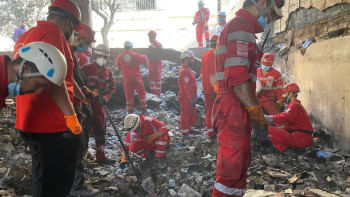Indian variant could turn Khulna division into Covid-19 hotspot
People of Khulna division are at great risk of being infected with the Indian variant of coronavirus, as six of its districts have borders running for a total of 284 km with India, which is struggling to control the Covid-19 surge and the new variant -- B1617.
Numerous people are crossing the border illegally, without going through medical procedure, and coming into the country to avoid the 14-day mandatory quarantine.
Besides, most of the people stranded in India are coming back through Jashore's Benapole and Chuadanga's Darshana -- both of which are in Khulna division.
Jashore, a bordering district, is currently hosting a large number of people coming from India through Benapole land port, after Bangladesh closed its border with the neighbouring country on April 26 to stop the fast-spreading Covid-19 variant from entering the country.
Despite the risk, the district has no central oxygen system, the most important facility for serious Covid-19 patients, at its 250-bed general hospital.
The hospital is currently supported by 265 small and big oxygen cylinders. Each cylinder can supply oxygen for up to one hour, said Dr Arif Ahmed, resident medical officer of the hospital.
He also said installation work of a central oxygen system is ongoing, but the oxygen tank is yet to be imported from India.
The general hospital has recently started three intensive care unit (ICU) beds with minimum facilities.
In Khulna, there was a central oxygen system with 5 kilolitre (kl) capacity at Khulna Medical College Hospital (KMCH), which has been upgraded to 10 kl by Linde Bangladesh recently, said KMCH Director (in-charge) Dr Bidhan Chandra Ghosh.
However, the capacity is still below demand at the 500-bed hospital, which sees 1,200 patients daily on average, said the director.
The government has provided a 5 kl-capacity central oxygen system. Once it is installed, the demand would be mostly met at KMCH, said Dr Bidhan.
In a recent visit to KMCH, our Khulna correspondent found that the oxygen tank for the system has been lying there for around six months.
Installation of the second oxygen system will start soon, as the process of sanctioning Tk 97 lakh for that purpose is underway, said Ashutash Karmakar, executive engineer of Health Engineering Department, Khulna.
Currently KMCH has a 20-bed ICU unit and 14 high-flow nasal cannulas, said hospital sources.
Dr Rashida Sultana, director (health) of Khulna division, said the division's treatment facilities are sufficient to tackle the new Covid-19 threat.
However, according to respective civil surgeons, only Khulna, Satkhira, Meherpur, Kushtia, Chuadanga and Narail have central oxygen system.
The division has a total of 49 ICU beds and 304 high-flow nasal cannulas, said Dr Rashida.
But this correspondent found 46 ICU beds operational, and the division has only 88 active high-flow nasal cannulas.
Five districts -- Jhenidah, Magura, Chuadanga, Bagerhat and Narail -- have no ICU facility, said civil surgeons concerned.
After the border was closed, some people were detained by Border Guard Bangladesh while they were entering the country through bordering areas in Jhenidah, Kushtia and Satkhira.
A total of 40 Covid-19 patients have so far been identified with the Indian variant as of yesterday, according to the Institute of Epidemiology, Disease Control and Research (IEDCR). Almost all the patients infected with the Indian variant are from Rajshahi and Khulna divisions, they added.
Eight of them had no recent record of visiting India, suggesting local transmission, according to health officials.
Asked, Prof Ridwanur Rahman, a medicine and infectious disease specialist, told The Daily Star, "We need to take steps to reduce the rapid spreading of the deadly virus as well as the death rate."
"Lockdown should be imposed immediately in the respective district when the infection rate rises above 15 percent," he said.
Besides, he said capacity and oxygen supply of the hospitals of those districts, currently vulnerable to mass spreading of the virus, must be increased.
[Our correspondents from Khulna, Bagerhat and Jhenidah contributed to this report]

 For all latest news, follow The Daily Star's Google News channel.
For all latest news, follow The Daily Star's Google News channel. 



Comments